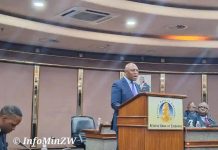THE Reserve Bank of Zimbabwe (RBZ) has moved to offer banking institutions in the country a cheaper financing facility in a bid to boost credit availability to the private sector and economic growth support.
Speaking in a recent Monetary Policy Statement, RBZ governor John Mangudya expressed deep concerns about the depressed levels of productivity and their implications on both exchange rate stability and potential output of the economy.
“In this regard, and consistent with the monetary targeting framework, the bank will introduce measures and incentives to encourage banks to increase long term lending to enhance credit to the private sector to support economic growth.
“Under this framework, banking institutions with loan maturities of above two years in their loan portfolios will be able to use their commercial loan instruments as collateral for borrowing from the Reserve Bank,” he said.
The central bank governor said this measure is meant to break the cycle of short-termism in the credit market as well as encourage banks to promote long term savings in their portfolios.
In addition, the RBZ will also be deepening financial inclusion, particularly aimed at enhancing access to finance by small to medium enterprises in consideration of their growing role in the economy.
“The Bank shall, therefore, only intervene on a targeted basis to support the productive sectors of the economy under its special productive sector financing window in its role as the lender of last resort to stimulate economic activity,” Mangudya said.
The interest rate under the productive sector financing window shall be linked to the Treasury Bill rate as determined by the market.
According to the central bank’s latest monthly economic review, the distribution of credit to the private sector is currently dominated by households constituting 20% ; agriculture, 21 %; distribution, 12 %; services, 9 %; manufacturing, 8 %; financial organisations and investments, 19 %; mining, 7 %; transport and communications, 2 %; and construction 0.67%.
The nation’s private sector has grappled with inadequacy of foreign currency capital which is critically scarce in the country.
To that effect, most companies that have so far reported their financial performance for the first half of 2019 have expressed pessimism over the possibilities of positive productive out turn going forward.






